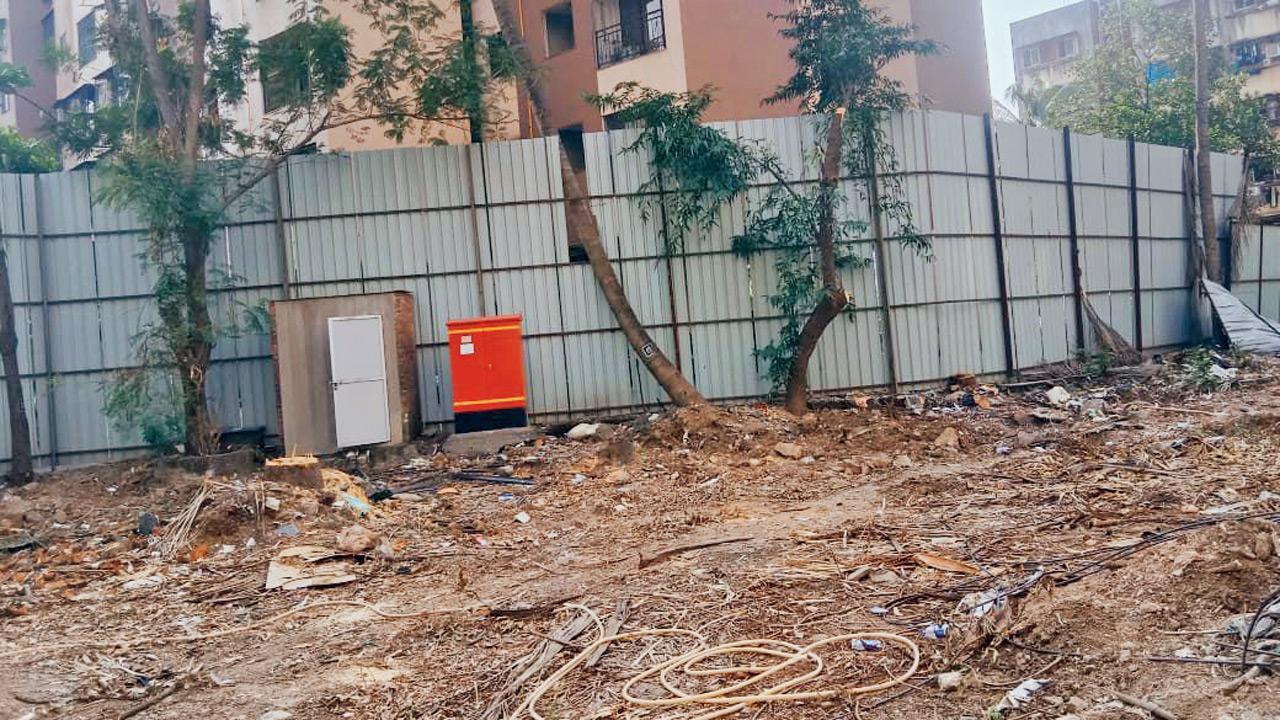Tilak Nagar society residents got the nod for redevelopment after battling civic hurdles for years after BMC’s approval to cut trees

The society compound was cleared last month
Collective cooperation and a strong representation of their arguments before the Tree Authorities led to a significant victory for the residents of Tilak Nagar society in Chembur. Not only did they obtain permission to cut trees that had grown within their fenced society compound over the years, but they also paved the way for self-redevelopment, which had been pending for the last 17 years. The plot was cleared last month.
ADVERTISEMENT
mid-day, in its article titled “Trees delay Tilak Nagar redevelopment in Mumbai from taking roots” (dated August 18), highlighted how the redevelopment of the building had been stalled for 17 years, awaiting the BMC’s approval to cut trees on the plot.
The issue
MHADA Building No. 93 (Tilak Safalya CHS Ltd), which went in for redevelopment, was initially abandoned by a builder who had promised to rebuild it. When the residents took matters into their own hands, the BMC Tree Authorities allegedly became an obstacle, numbering all the trees on the plot and restricting any trimming or cutting without explicit permission, according to the residents.
 Trees numbered by BMC inside the fenced society compound
Trees numbered by BMC inside the fenced society compound
The building, constructed in 1961 by the MHADA (Maharashtra Housing and Area Development Authority) in Tilak Nagar, Chembur, was over 63 years old. It housed lower-income families, primarily erstwhile mill workers and blue-collar labourers. Successive generations of these families continued to live there.
“As the building developed structural problems, the residents of decided to use the state government’s redevelopment program and handed over the construction to a private developer on May 9, 2007. The building was subsequently demolished in August 2010. However, the developer failed to commence construction, and the site soon turned into a dumping ground for trash, despite being barricaded with temporary tin sheets,” said advocate Shreeprasad Parab, who grew up in the society and represents the residents.
From 2009 to 2024, the site accumulated rubbish, including half-eaten fruits and vegetable waste thrown by passersby. Over time, nature stepped in where the builder failed, and some of the mango and coconut seeds within the compound sprouted into large trees, Parab added.
The local BMC ‘M’ Ward Garden Department—which also functions as the Tree Authority for the area—was informed about the planned construction at the site. “In their wisdom, they allegedly numbered each tree in the compound, making it impossible to cut them without the Tree Authority's permission,” asserted Advocate Parab.
Challenge of tree numbering
After obtaining the MHADA offer letter and an NOC for self-redevelopment, the society cleared 17 years of debris and filth from the site. However, the trees, which had been numbered by the municipal corporation, posed a major hurdle. Without cutting these trees, the redevelopment project could not proceed, as they were located in the construction zone.
The society applied to the Tree Cutting Department and, after intense follow-ups, succeeded in obtaining the required NOC from the municipal authorities, advocate Parab explained.
The residents questioned how the municipal corporation could justify numbering trees within a private plot owned by MHADA and leased to a housing society. Following numerous representations to the Tree Authorities, the NOC was finally granted. With this approval, the society resumed site preparation and applied for NOC from the IOD (Intimation of Disapproval) and CFO (Chief Fire Officer). Persistent follow-ups resulted in the issuance of both approvals in a short time, residents pointed out.
Unity behind success
“The key to the success of self-redevelopment is the unity of the members,” said advocate Parab. “This unity enabled the society to obtain approvals in a time-bound manner. The society spent no more than R5,000, primarily on travel expenses, to secure the IOD,” he added. The society is now working to obtain the Commencement Certificate (CC) from MHADA and preparing for RERA registration. The actual construction is expected to begin in the first quarter of the coming year, Parab concluded.
 Subscribe today by clicking the link and stay updated with the latest news!" Click here!
Subscribe today by clicking the link and stay updated with the latest news!" Click here!







